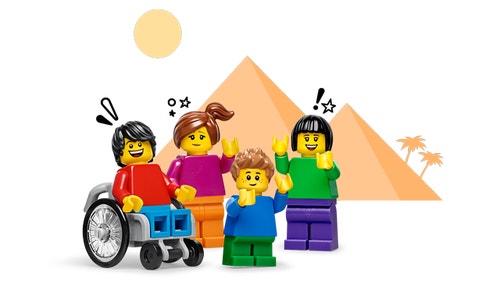SPIKE™ Essential
The Great Desert Adventure
It’s time for another great adventure. Help the team reach the pyramids!
45-90 min.
Beginner
Grades 1-2

Prepare
(NOTE: This lesson will extend over two 45-minute class sessions.)
- Review the Great Desert Adventure lesson in the LEGO® Education SPIKE™ App.
- If necessary, pre-teach these related vocabulary words: brainstorm, desert, pyramid, imagine, and wonder.
- Consider the abilities and backgrounds of all your students. Differentiate the lesson to make it accessible to everyone. See the Differentiation section below for suggestions.
- If time allows, plan and facilitate the language arts extension. See the Extension section below for more information.
PART A (45 Minutes)
Engage
(Whole Class, 10 Minutes)
- Facilitate a quick discussion about brainstorming and decision-making.
- Talk with your students about ways of finding a variety of solutions to solve a problem in your classroom.
- Ask questions, like: Why should you come up with a lot of ideas when trying to solve a problem? Why should you try different ideas?
- Introduce your students to the team and the challenge: brainstorming how the team will get to the pyramids.
- Distribute a brick set, any additional brainstorming materials, and a device to each group.
Explore
(Small Groups, 25 Minutes)
- Have your students use the LEGO® Education SPIKE™ App to guide them through their first challenge:
- Create a way for the team to get to the pyramids. Use at least one motor or sensor (i.e., Color Sensor or Light).
- Your students can use the LEGO bricks supplemented with additional materials to brainstorm. Encourage them to come up with multiple solutions.
Explain
(Whole Class, 10 Minutes)
- Gather your students together and facilitate a sharing session where they present their initial ideas and provide feedback and suggestions to their peers.
PART B (45 minutes)
Elaborate
(Small Groups, 30 Minutes)
- Have your students build, program, and test the prototypes and ideas they came up with during the brainstorming session in Part A of this lesson.
- Remind them to use at least one motor or sensor.
- Encourage them to test and refine their models and programs over 2-3 iterations.
- You can find coding and building support in the Tips section below.
Evaluate
(Whole Class, 15 Minutes)
- Ask guiding questions to encourage your students to “think aloud” and explain their thought processes and reasoning in the decisions they've made while building and programming.
- Have your students clean up their workstations.
Observation Checklist
- Measure your students’ proficiency in applying their computational thinking skills to complete the given task.
- Create a scale that matches your needs. For example:
- Needs additional support
- Can work independently
- Can teach others
Self-Assessment
- Have each student choose the brick that they feel best represents their performance.
- Yellow: I think I can design, build, and program a solution.
- Blue: I can design, build, and program a solution.
- Green: I can design, build, and program a solution, and I can help a friend do it too.
Peer-Feedback
- In their small groups, have your students discuss their experiences working together.
- Encourage them to use statements like these:
- I liked it when you…
- I'd like to hear more about how you…
Tips
Coding Tip
- There are no coding instructions or Inspiration Coding Blocks for this lesson.
- Encourage your students to experiment and find their own solutions.
Model Tip
- There are no building instructions or Inspiration Images for this lesson.
- Encourage your students to create their own models.
- If they need additional guidance, refer them to the building instructions for previous lessons in this unit.
- There's no right or wrong model for this lesson.
- Your students can create entirely new models, find inspiration in the models from previous lessons, or simply recreate models from earlier lessons.
Differentiation
Simplify this lesson by:
- Reading the Great Desert Adventure story from the
LEGO® Education SPIKE™ App aloud to your students - Giving your students the building instructions from previous lessons to use as inspiration for their new way of getting to the pyramids
Increase the difficulty by:
- Using two motors or sensors
- Creating two unique programs, resulting in two different travel experiences using the same model
Extension
- Have your students write a story about why the team decided to visit the pyramids, how they got there, and what they saw when they arrived.
If facilitated, this will extend beyond the 90-minute lesson.
Language Arts: CCSS.ELA-LITERACY.W.1.3
Teacher Support
Students will:
- Apply computational thinking skills to solve the given problem
- Identify the main characters and their problem in the story
- Participate in collaborative conversations to solve the problem
(one for every two students)
- LEGO® Education SPIKE™ Essential Set
- Device with the LEGO® Education SPIKE™ App installed
- OPTIONAL: Additional materials for brainstorming (e.g., notebook paper, science notebook, etc.)
- All previously-listed
ISTE 1.5a, 1.5c, 1.5d
Language Arts Extension
- CCSS.ELA-LITERACY.W.1.3